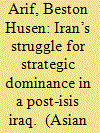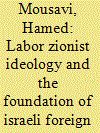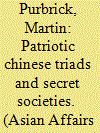|
|
|
Sort Order |
|
|
|
Items / Page
|
|
|
|
|
|
|
| Srl | Item |
| 1 |
ID:
167682


|
|
|
|
|
| Summary/Abstract |
The term globalization, encompassing politico-economic and socio-cultural aspects, is widely used to describe the results of rapid modernization on Saudi Arabia in an era of rapid societal transformation. Whilst the outward signs of increased globalization in the Kingdom are highly visible, the underlying effects particularly in terms of the politico-economic and socio-cultural less so. Indeed, globalization is often characterized as inevitable or unstoppable. Yet, in a ‘globalized’ Saudi Arabia the impact of globalization is not always perceived as being positive, in particular its impact on notions of individual, national or Islamic identities. Research conducted for this article demonstrates that young Saudi men identify clearly both positive and negative effects of globalization on identity narratives, whether individual, national or Islamic. Indeed, the issue of how young Saudi men negotiate their identity in light of increased globalization raises important questions regarding the consequences of increased globalization on young Saudi men's sense of their own identity, and by extension the government's promotion of an officially sanctioned Saudi national identity, in an era of rapid societal transformation.
|
|
|
|
|
|
|
|
|
|
|
|
|
|
|
|
| 2 |
ID:
167683


|
|
|
|
|
| Summary/Abstract |
Iran's influence and presence in Iraq have increased significantly in recent years. The collapse of the Saddam's dictatorship in 2003, after the US invasion, served to inflate Iran's influence in Iraq, particularly in the post-ISIS era. In this connection, Iran has used various means and tools to develop its strategy in Iraq. This article argues that Iran's current strategy in Iraq stems from a Realpolitik agenda rather than an ideological one, concerned more with political, economic, and security interests than pursuing revolutionary objectives per se. To this end, Tehran has largely relied on long-established relationships with several pro-Iranian political parties and militia groups. These relationships are often couched in religious ideological terms as a foundation and justification for its future strategy in post-ISIS Iraq. The questions that this paper will address are the following: what was Iran's role in defeating ISIS in Iraq? How has Tehran benefitted from its long-term relationships with Iraqi political parties and militia groups? What are the Iranian sources of power in Iraq and how do they help Iran gain strategic dominance in Iraq?
|
|
|
|
|
|
|
|
|
|
|
|
|
|
|
|
| 3 |
ID:
167684


|
|
|
|
|
| Summary/Abstract |
Less than a month after the Kurdistan independence referendum, the Iraqi Army and units of the Popular Mobilisation Forces (PMF) attacked the disputed province of Kirkuk on October, 16, 2017. Unlike most national defence forces, the Kurdish Peshmerga is divided along partisan lines between the two largest parties in Iraqi Kurdistan. This particular area was largely under the control of units affiliated with the Patriotic Union of Kurdistan (PUK), which decided to make a strategic withdrawal in the face of superior numbers and firepower. The city was then retaken in short order by forces loyal to Baghdad, as were all other disputed territories previously under Kurdish control. Subsequently, the allegation that the PUK had retreated too easily has been described by the rival Kurdistan Democratic Party (KDP) and others as a betrayal of the Kurdish people by the PUK. This has created two competing post-event perspectives: first, that the Peshmerga forces should have defended Kirkuk to the last man and should not have left their front line trenches; second that the withdrawal of the Peshmerga was a deliberate and rational military reaction to overwhelming opposition. This article critically assesses both perspectives and finds that partisan divisions in the Peshmerga critically undermined the ability of Kurdish forces to defend the disputed areas that they controlled. Instead of serving as motivation of create a unified fighting force, the loss of Kirkuk has only served to deepen those divisions.
|
|
|
|
|
|
|
|
|
|
|
|
|
|
|
|
| 4 |
ID:
167685


|
|
|
|
|
| Summary/Abstract |
The paper argues that during the Mandate period the Labor Zionist movement was able to successfully create a Sabra identity based on its ideology that was constructed in opposition to the presumed characteristics of the “exile Jew” and how such an identity played a central role in the formation of a security oriented foreign policy. Labor's creation of the Sabra through the "Hebrew Revolution" can be considered as one of the most successful episodes of the twentieth century in which a new identity was created in order to serve ideological goals. Labor's Zionist ideology, which sought to create a “new Jew” that would form the basis of the Jewish national movement, was translated into an identity that in contrast to the diaspora Jew relied on collectivism, agriculture, secularism, and most important of all physical strength and sacrifice in defence of the Jewish nation. This translated into a security-oriented foreign policy that heavily relied on military force and emphasized internal power and strength, which Labor elites argued could only be achieved through self-reliance and independence particularly in regards to defence issues. Such an orientation would form the basis of Israeli foreign policy for years to come.
|
|
|
|
|
|
|
|
|
|
|
|
|
|
|
|
| 5 |
ID:
167681


|
|
|
|
|
| Summary/Abstract |
Triad and other secret societies have been mutual aid groups, personal networks amongst Chinese, organised criminal gangs, as well as associated with patriotism. The perceived patriotism of triads originated in the support of some for the restoration of the Ming Dynasty and overthrow of the Manchu Qing dynasty. The association of triads with patriotism continued as triad and secret societies used regimes for advantage and regimes likewise used them when in need of support. The Nationalists (Kuomintang), the Communists, and even the British have worked with or used triad or other secret societies when the need has arisen. The pretext of patriotism is a central factor in the durability of triad and secret societies in China. This article seeks to explain the frequent association of triad societies with patriotism and why this has contributed to the durability of the criminality of triads that overlooks their long-term criminality.
|
|
|
|
|
|
|
|
|
|
|
|
|
|
|
|
| 6 |
ID:
167680


|
|
|
|
|
| Summary/Abstract |
Justin Rowlatt, the BBC's South Asia Correspondent, writes a reflection on the 1919 Amritsar Massacre and the 1919 Rowlatt Act, which was a precursor to the Massacre. The author is the great-grandson of Sir Sidney Rowlatt, who was responsible for the 1919 legislation.
|
|
|
|
|
|
|
|
|
|
|
|
|
|
|
|
| 7 |
ID:
167679


|
|
|
|
|
| Summary/Abstract |
In this article, Sir David Warren, who was British Ambassador to Japan from 2008 to 2012, lays out the historical background to modern Japan, its political and economic structures (and international relationships); explores why we tend not to think of Japan as affected by the populism that we see in other Western democracies; and asks why Japan still presents itself as such a ‘different’ country.
|
|
|
|
|
|
|
|
|
|
|
|
|
|
|
|
|
|
|
|
|